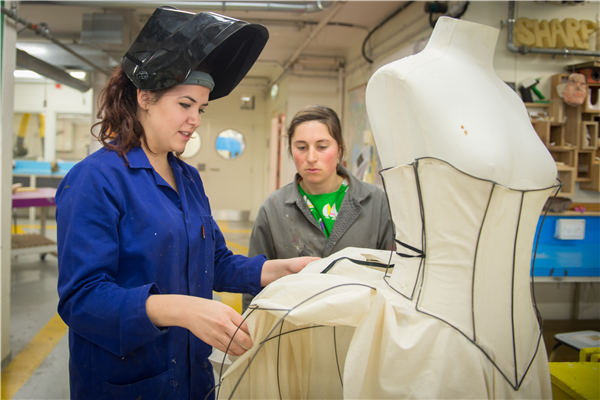New Zealand offers range of choices for students


Jason Docherty is doing makeup for a college student who is attending a dinner hosted by the Study in Wellington delegation in Beijing.
Two hours later, the director of the prosthetics and special makeup team at Weta Workshop has turned the student into a hobbit.
Weta Workshop is a design studio and manufacturing facility serving the world's entertainment and creative industries based in New Zealand. And it is best known for producing the sets, costumes, armor, weapons, creatures and miniatures for director Peter Jackson's The Lord of the Rings film trilogy, a job which earned it four Academy Awards.
Weta's success is just one example of how the creative industry is thriving in New Zealand.
And education institutions in New Zealand, especially its capital, Wellington, are quickly responding to the industry, by upgrading and setting up new majors.
The Study in Wellington delegation visited Beijing in March, with representatives from universities and the creative industry sector introducing programs to potential Chinese students.
The representatives came from the Victoria University of Wellington, Massey University, Te Auaha New Zealand Institute of Creativity, Weta Workshop and the World of WearableArt.
Speaking about the opportunities available for foreign students, Zhu Lin, the international student recruitment manager at Massey University, says: "International student numbers in Wellington have increased a lot recently. Now, we have 5,200 international students and 2,900 of them are Chinese."
The College of Creative Arts at Massey University is a world-class art and design school based in Wellington, which was ranked the No 1 university in the Asia-Pacific by Red Dot, the international design awards agency last year.
As for the creative industry in the country, Zhu says: "It is really growing."
In 2014 the college expanded its range of offerings through its School of Music and Creative Media Production.
And, according to Zhu, Massey is launching a master of design program with its students taking a two-week internship at Weta Workshop.
Speaking about other opportunities on offer, Zhu says: "We have different types of internships on offer to international students. And although Wellington is small, it is a special city, as we collaborate with each other and support each other."
Meanwhile, World of Wear-able art, an annual international design competition held in Wellington, is also a partner of Massey University. And according to Ali Boswijk, the head of international and business development at WOW, they are collaborating with Massey students on an outdoor exhibition this year.
"We employ 400 people for the actual event each year, but we have about 120 designs on display - so there are a lot of areas for performance, technology, makeup and other things."
Also collaborating with WOW, the Victoria University of Wellington is providing a range of programs for students interested in design, theater and film.
Speaking about what Victoria University of Wellington offers, Matthew Eglinton, its associate director of international recruitment and business development, says: "We are expanding relationships in China and throughout the world."
And as part of this, Victoria University signed a memorandum of understanding and an agreement on training talent with the Beijing Film Academy.
"Now, students from the Beijing Film Academy can come to Victoria for one semester or two semesters and take that credit back to China," says Eglinton.
Li Ran, the dean of the International School at the Beijing Film Academy, says Victoria University is strong in film technology, so the two universities will focus on this area of collaboration.
"In future, students from both universities can collaborate and make films," says Li.
In 2017, Victoria University launched a new major, the Master of Fine Arts (Creative Practice), which focuses on design, filmmaking, music and theater skills to prepare students for careers in the creative industries.
Zhang Huanhuan, a scriptwriter from China, is now pursuing an MFA degree in Wellington.
He learned scriptwriting in New Zealand in 2006, and after 10 years of work, has now decided to return to his studies.
"The program is a bit like an MBA for the film industry, and I can learn how to make a budget and run a film business," says Zhang, who is planning to bring New Zealand films to China after he graduates.
"New Zealand is open and equal, and if you want to be in a cultural environment like this, it's a good place to study," says Zhang.




































